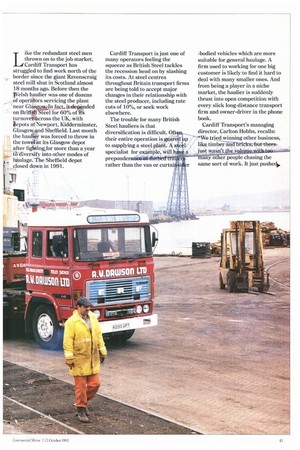L ike the redundant steel men thrown on to the job
Page 45

If you've noticed an error in this article please click here to report it so we can fix it.
market, Cardiff Transport has struggled to find work north of the border since the giant Ravenscraig steel mill shut in Scotland almost 18 months ago. Before then the Felsh haulier was one of dozens of operators servicing the plant 'near Glais fact, it depended een on Brill teel for 60% of its turnov cross the UK, with lepots at Newport, Kidderminster, GlasgowAnd Sheffield. Last month the haul.* was forced to throw in the towstat its Glasgow depot after figliting,for more than a year ttl diversify into other modes of haulage. The Sheffield depot closed down in 1991.
Cardiff Transport is just one of many operators feeling the squeeze as British Steel tackles the recession head on by slashing its costs. At steel centres throughout Britain transport firms are being told to accept major changes in their relationship with the steel producer, including rate cuts of 10%, or seek work elsewhere.
The trouble for many British Steel hauliers is that diversification is difficult. their entire operation is gear to supplying a steel plant. A st41 specialist for example, will h preponderance of rather than the van or curt -bodied vehicles which are more suitable for general haulage. A firm used to working for one big customer is likely to find it hard to deal with many smaller ones. And from being a player in a niche market, the haulier is suddenly thrust into open competition with every slick long-distance transport firm and owner-driver in the phone book.
Cardiff Transport's managing director, Carlton Hobbs, recalls: ."We tried winning other business, like timber a—"irdlifIcks,-but-therejust sn' any o er people chasing the same sort of work. It just pushed',




























































































